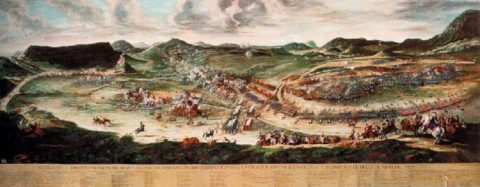THE BATTLE OF ALMANSA
Recently some Valencian politicians have tried to rewrite history, claiming that the Battle of Almansa in 1707 was a struggle by Valencians to obtain their independence from Spain. Nothing could be further from the truth (as if truth matters these days).
311 years after the battle which took place on the 25th April 1707 at Almansa, between two armies comprising 10 different nationalities, and which brought about the beginning of the Borbon monarchy in Spain, people from many more nationalities gather in Almansa (Albacete province) every April to remember that event, with a series of activities including concerts, conferences, religious services, a medieval market and a ‘walk for peace,’ following the route taken by the troops of Lord Galway from Caudete to Almansa on the morning of the battle.

The Battle of Almansa was a curious battle in which the commanders on both sides were British; a battle involving 10 European nations who, in some cases fought on both sides, such as the French Huguenots who sided with the Archduke Charles of Austria.
The War of Spanish Succession was part of a wider European conflict between Catholic France under King Louis XIV and a protestant coalition of Britain, Holland, Portugal and Austria, although in some cases the differences were more political and strategic than religious.
Much of the conflict took place along or near the Mediterranean coast; many of the battles, landings and sieges occurred in places in the Valencian Community that we now visit for a day out; places such as Denia, Alicante, Villena, Peñiscola and San Mateo.
April 25th is a day of commemoration in Valencia; the outcome of the battle was a centralised Spain and the beginning of the present Borbon monarchy, which meant a loss of power for regions such as Valencia and Catalonia.
A remarkable painting that was produced after the battle on the orders of the victorious monarch Felipe V, is a kind of Bayeux Tapestry, telling the whole story in one painting, which can presently be seen in Almansa Town Hall.
The battle itself was an important victory for the Borbon cause, although the war would continue until 1714 with the signing of the Treaty of Utrecht, when Europe accepted Felipe V as King of Spain.
The only Valencians present on the fateful day in 1707 at Almansa were 300 soldiers fighting on the Borbon side; hardly an anti-imperialist Valencian struggle against centralisation and oppression.

